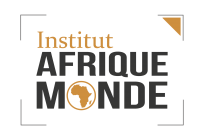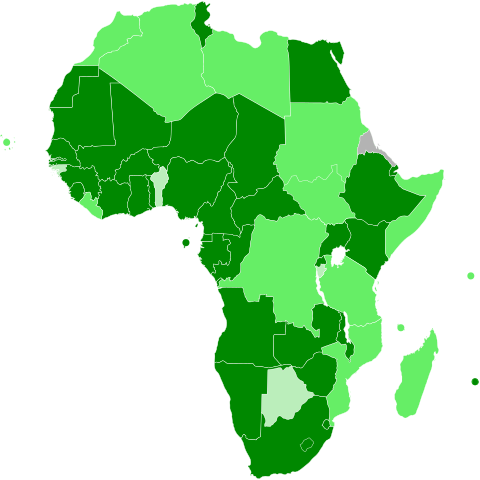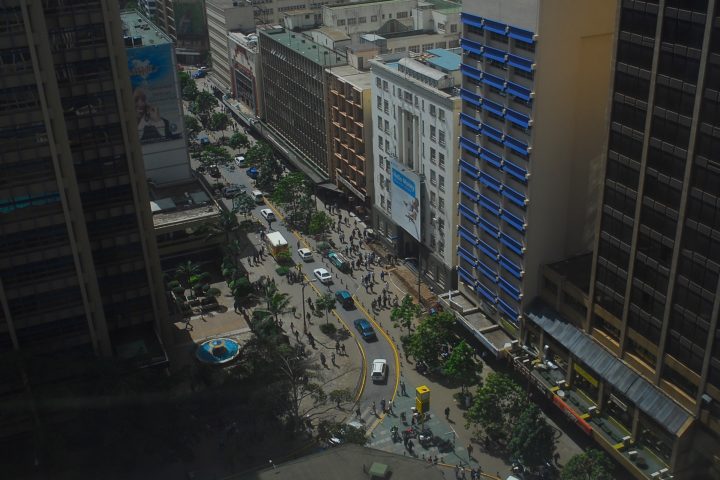Paragraphs 13, 25, 27 and 28 of the Manifesto of the Fiftieth Anniversary of African Independence mention the predominant place to be given to cultural diplomacy within African States[1], the prominent role of the diaspora[2], the necessary contribution of Africa’s voice to ecological issues[3], the revitalization of African languages as vehicles for the transmission of endogenous knowledge through the use of new technologies[4].
The Charter of the African Renaissance emphasizes the duty to inventory the intangible culture of the African continent as well as the historical foundations of African thought[5]. The text takes up the transmission of knowledge through contemporary technologies in support of African languages (Title 4)[1], sets out the fundamental principles of the cultural policies to be implemented[2] and the positive force of migration phenomena[3].
The aim of the Charter of the Africa World Institute is to enrich the sometimes erroneous vision of Africa that the world has of it with a legitimate perspective, based, among other things, on historical realities. By formulating proposals leading to concrete solutions, the formulation of possibilities that do not lead to antagonism within the framework of the texts of the African Union, the “societies and cultures” cluster is part of this objective of rebuilding and/or deconstructing recurring discourse with an “Afro-pessimistic” tendency.
The aim will be to highlight the essential contributions of this continent to the contemporary issues facing our world, to assess the effectiveness of the AU’s decisions with the signatory governments, to examine the gaps to be filled, as well as the successes, taking into account regional and local processes, individual and collective initiatives. What we can already take for granted is the adoption of these texts and declarations of principles, which have the merit of existing and setting a framework for the priority challenges facing the African continent.
II. Problematic issues
A problem could be articulated around three verbs: “learn, know, power”. Indeed, we could only act knowingly !
African cultural soil is fertile. The source of impoverishment of the continent would result, in part, from the alteration of this soil. How to find ways to drive our endogenous development strategies through the implementation of new economic and educational models.
Centuries of scholarship, science and culture are erased by ignorance, misinterpretation and the disappearance of a word, a sign, a technique or a useful concept. Thus, Africa’s contribution to medicine, education and ecology deserves to be better known and more in-depth. Should we not preserve what is essential to our common survival?
How can these assets, knowledge, skills and competences be preserved, valued and integrated as tools for instruction and personal development for an extremely young[4] and therefore creative and dynamic population?
How can we access information and culture, knowledge and its beneficial contributions in a concrete way? What are the transmission vectors that Africa needs to equip itself with to do this?
It is accepted that “man is at the centre of the problem and not the object“, emblematic of material culture. Is the absence of “objects – support” sufficient to justify the flaw in the transmission? The question thus asked seems biased if we admit that we are not part of a culture of the primacy of the object.
III. Priority issues :
It is a question of projecting oneself into a cultural prospective and a reflection on the strategic management of development.
1. African, intra-African migration: positive migration ?
African societies are, by their very nature, multicultural. Migration is not worth breaking, but is perceived as an acceptance of flow and fluctuation. What about this contemporary identity, hybrid, in perpetual movement, strong in borrowing and refounding, developed on the basis of a word of multiple origins, having multi belonging as a base where the question of the crossroads is more to be asked than that of origin, where the collective, place of sharing, openness, alloy and possible alliance differs from communitarianism?
2. New forms of cultural expression:
Enhance cultural productions by taking note of the development of new communication and information technologies, the digitization of knowledge, the virtual community, cyberspace (e.g. BLAIR chronicleworld.)
3. Resistance to linguistic negativity:
Indeed, the duty of vigilance over the use of emblematic words and their subversion is not in vain. The continent suffers from the impact of the lexicon, from a “negative” semantic field, even in the places where knowledge is disseminated. The vocabulary has an impact on the way Africans view themselves, which sometimes ends up identifying with those who define them. Refreshing words, pointing out the relevance of the languages used to express a complex reality could be one of the research axes.
4. Intangible heritage and cultural institutions:
To operate a selection of education systems that integrate African values of universal scope (training systems such as initiation groups in traditional societies, educational games, tales), to support the popularization of this intangible heritage[5] with the concern not to fall into folkloric segregation.
5. Ecological Africa
How can Africa contribute to the ecological challenge through the transmission of appropriate ancestral values ? The aim is not to find all the solutions in traditional societies but to raise awareness that ecology is an intrinsic part of the culture of these increasingly urbanized populations. This will not solve the harmful consequences of man’s secular action on his environment, it will not directly contain the issue of climate refugees but would at least have the consequence of making the need for a search for local solutions recognized. It is then up to international bodies, sovereign States and regional policies as a whole to take the necessary accompanying measures, based not only on new scientific and economic data but above all on common sense, experience and human wisdom (one and indivisible) from wherever it may come from.
7. Illicit trafficking in cultural property
Along with drug and arms trafficking, the black market in antiquities and culture is one of the most entrenched illicit businesses in the world. Also, during wars and armed conflicts, objects are endangered (Mali, Zaire, Egypt)
A study conducted by the United Kingdom House of Commons in July 2000 estimated that the illicit trafficking of antiquities represented $6 billion per year (F. ISman, I predatori dell’arte perduta, il saccheggio dell’archeologia italia, Milan, 2009, p. 29). Ten years later, the UN report on transnational crime estimated global cocaine trafficking at $72 billion, arms trafficking at $52 billion, heroin at $33 billion, counterfeiting at $8 billion and cybercrime at $28 billion (UNODC, United Nations Office on Drugs and Crime, Vienna, annual report 2010).
Another study estimated that illicit trafficking in cultural property amounted to at least $2 billion per year (G. Norman, Great sale of century, “the Independent”, 24.11.1990).
Other sources estimate that global sales of cultural property, legal or otherwise, reached $39.3 billion in 1993. Today, this figure is estimated at 60 billion dollars, which represents a 50% increase in 10 years and an unprecedented growth in the supply on the Internet (C. Forrest, International law and the protection of cultural Heritage, New York, 2010).
According to surveys conducted on the illicit trafficking of works of art worldwide, it is estimated that “intermediaries pocket 98% of the final market price of the objects sold”. It is estimated that between the start of the underground excavations and the final sale, the value of the most beautiful works of art is multiplied by a hundred, which represents a higher price increase than drugs.
According to Alain Godonou, former Director of the School of African Heritage and current Director of UNESCO’s Division of Cultural Objects and Intangible Heritage, most African countries have lost 95% of their cultural property.
By looking at the exhibitions in the major collections, researchers determined that 70% of the objects on display were described “in a vague way”.
The need at the end of the 1960s to put in place legal tools to combat illicit trafficking in cultural property led to the creation of international legal instruments, the oldest of which is the 1970 UNESCO Convention. Other legal instruments will be put in place, followed by ethical codes. Intergovernmental and non-governmental organizations will be significant supporters in the fight against this scourge. Nevertheless, despite all this arsenal, traffic is decreasing only slightly. It then seems obvious that solutions must be sought elsewhere than in the legal treatment of this sensitive phenomenon, which combines both the memory of peoples and the notion of merchandise.
The 1970 UNESCO Convention on the Means of Prohibiting and Preventing the Illicit Import and Transfer of Ownership of Cultural Property is the first international legal framework for combating illicit trafficking in cultural property in peacetime. It now has 120 States Parties.
The Convention shall apply only to cultural objects stolen or illegally exported from one State Party to another State Party after the date of entry into force for the two States concerned. Articles 1 and 4 of the Convention provide a broad definition of cultural property. However, the property must be designated by the State as important for archaeology, prehistory, history, literature, art or science.
States Parties must adopt protective measures on their territory (Art. 5) through the elaboration of appropriate national legislation and codes of conduct for the art market, the establishment of national services for the protection of cultural heritage, the development of educational programmes to raise awareness of respect for cultural heritage. What about the effectiveness of these provisions in African States?
Nakhana Diakhité Prats
[1] “That there is an urgent need to ensure the promotion of African languages, vectors and vehicles of the tangible and intangible cultural heritage in its most authentic and essentially popular form, but also as a factor of development;” (Language, intangible culture)
“Aware… that culture is the surest way for our peoples to promote Africa’s own path to technological development, and the most effective response to the challenges of globalization” NICT
(i) “Considering that the process of globalization facilitated by the rapid evolution of information and communication technologies constitutes both a challenge to cultural identities and cultural diversity and requires universal mobilization for dialogue among civilizations“… promoting the popularization of science and technology in each country, (d) affirmation of the principle of “strengthening the place of science and technology, including endogenous knowledge systems, in the lives of African peoples by including African languages” (languages)
[2] (g) Integrate cultural objectives into development strategies (cultural geopolitics)
Art 8 “The experience of previous decades recommends a renewal of national and regional approaches to cultural policy.”
Art 14: cultural actors “Elders and traditional leaders are cultural actors in their own right. Their role and importance deserve formal recognition so that they can be integrated into modern conflict resolution mechanisms and systems of intercultural dialogue.”
[3] TITLE VIII Africa and the African Diaspora: Art 33 The African Union shall take the necessary measures to establish institutions or “Houses of Africa” in countries where there is a significant African diaspora and elsewhere in order to: (a) promote positive awareness of Africa; (b) promote African positions and perspectives; (c) support the African Diaspora in its efforts to build relationships with its communities and governments in Africa and the world. (Diaspora)
[4] More than 50% under 25 years old
[5] Memory of Africa
[1] Manifesto of the fiftieth anniversary, &13: “We have drawn from the cultures of the West and the East. We in turn offer the possibility for all peoples to tap into our own. There would be everything to gain for human development if traditional cultures, sciences, arts, spiritualities and literature were to be valued in state diplomacy.” (Cultural Geopolitics)
[2] &25 “We consider the solidarity of the historical and recent diaspora as one of the ferments of Africa’s endogenous development policy. It now represents the sixth largest region on the continent. The weight of its contribution, particularly financial, is essential for Africa’s development.” (Diaspora)
[3] &27 “…. the pursuit of improved quality of life is a central challenge. In this sense, health and environmental protection must be given priority. Our respectful contribution to nature, our cultural heritage, our sense of community are exceptional treasures to preserve…” (Ecological Africa)
[4] &28 “African languages are the foundation of Africa’s human heritage. We want them to be systematically included in school curricula and taught in all school cycles and used in information and communication technologies. On their appropriation by Africans depends the influence of Africa in the world.” (Languages, technology, EPAD ?)
[5] “Convinced that the unity of Africa finds its foundation first and foremost in its history” (historical foundations of African thought)
“that it is imperative to carry out a systemic inventory of the tangible and intangible cultural heritage, particularly in the fields of history and traditions, knowledge and know-how, arts and crafts, in order to preserve and promote it” (Duty of inventory) Title 1 art 3 d) preserve and promote African cultural heritage through conservation, restitution and rehabilitation (Intangible heritage, inventory)



